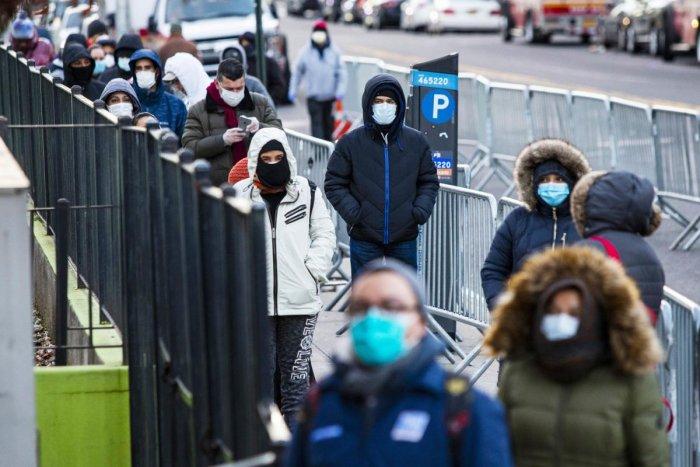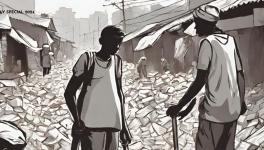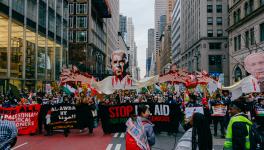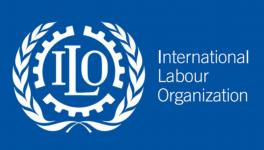The Wicked Concept of Herd Immunity

Representational image. | Image Courtesy: Deccan Herald
How many deaths will it take
Till he knows
That too many people have died?
The answer my friend is blowin’ in the wind,
The answer’s blowin’ in the wind. . . ”
(Bob Dylan)
Under two-pronged pressures from the ravages of a virus difficult to control and the looming danger of economic collapse, some of our leaders and opinion-makers seem to be veering towards a doctrine of “herd immunity” to underwrite policies of disclaiming responsibility for a mass infection and resulting death-toll. The idea is that as in the case of immense herds of wildebeest or buffalo roaming wild the epidemic will rip though our people, and those hardy and lucky enough to survive will preserve the species and re-populate it. A new Indian population will have emerged by then, immune to the virus. Sometimes it is packaged as “living with Coronavirus”, though that phrase should not normally imply giving up serious plans to save lives of those infected, which at times is the suggestion.
But the whole point of human society is that principles other than those of animal herds sustain it. Human societies devote special care to support infants, children, the sick and the aged, and they do so by adopting methods to protect those sections. Besides, historical human societies have been organised in more complex forms such as classes, and in more complex ways like being governed by rules consciously formed and/or followed by members, where the linear logic of the herd falls flat. There may well be conscious decisions allowing some uncertainty, but with a definite intention of restricting the play of chance. That is how advances in civilisation are measured.
However, given a hierarchical structure and unequal distribution of powers and resources, it is always possible to apply the herd logic to certain sections of the population and placidly attribute their travails to their animal-like unawareness of rights and duties. Indeed it appears very much the case that the extraordinary apathy to the plight of migrant workers (“penance”) might be motivated by some such theory. Millions who had emigrated from home states because of severe erosion of local economy under the neo-liberal regime suddenly lost their livelihoods and were denied current wages. They could neither “live with” starvation nor find any transport to take them home, and in desperation decided to trudge back on foot over hundreds of miles and for weeks together under the scorching sun, with little food or water.
The trick is not to admit such facts in public. But the theory itself is very much a shot in the dark. We may recall here the terrible condition of the British working-class in 1840s. The early industrial capitalists, extolled by popular writers like Samuel Smiles and denounced by Engels, then took it for granted that the enormous reserve army of labour uprooted by the thousands from “deserted villages”, would supply an inexhaustible source of cheap labour for their craving for profit and accumulation, no matter at how big a cost to their lives.
Factory owners hired and fired them by droves at will at wages that often did not permit bare subsistence. Tens of thousands perished in hunger, starvation and disease. Their condition of savagery raised goose-pimples in champions of “sweetness and light” like the famous critic Matthew Arnold and dismayed sombre prophets like Carlyle. But except a band of humanitarians and visionaries the elite intellectuals did little to understand and alleviate their lot. Their desperation and death were regarded by the ruling class as a fact of nature, and later Darwin’s epoch-making theory of evolution of the species was seized upon as explanation of the famous “survival of the fittest” among British people. The “fittest” were of course the enterprising captains of industry and the unfit were those wretched overworked workers.
Thus a social phenomenon was naturalised to mask its ignominy and inhumanity. The present concept of “herd immunity” seems to be a very similar pseudo-scientific exercise. The social Darwinism of the nineteenth century is an exploded myth, though it still gains transient life among racist scientists from time to time and is regularly shot down by scientists of integrity. It never loses popularity with far right politicians and journalists, though.
The critical question is the allocation of social resources among various strata of society at a time of grim and grinding inequality. That question is sought to be swept under the carpet by leaders and scholars enamoured of neo-liberal wisdom. They would skimp every penny spent on the poor unless it rakes in a pound of profit for the super-rich. The finance minister's much publicised “tranches” of grants and reliefs have been criticised by many as empty tricks of accountancy. Health services which have been severely mutilated by the false ideas of “animal spirits” as the motor of economic development are now utterly inadequate to bear the burden of the epidemic.
It will cost money to provide protection and care to the common masses whose lives are as much under the threat, if not more, from the raging virus as those of the rich. But to policymakers it amounts to pitiful waste of valuable resources on the unworthy. On the other hand machines and malls, the stock market and the corporations must be kept running. How might the sacred idols be preserved without the labour of the wretched of the earth? The Economy with a capital E, abstracted from the society that gives it flesh, is to be kept going after all. So a momentum has to be generated in it at least cost to the “employers”. But people who shoulder the tasks of production and distribution at the grass-roots might get canny and troublesome journalists might create a row to demand the right degree and kind of care for those bearing the brunt. So a doctrine of “herd immunity” dressed in proper scientific jargon has to be invoked to herd them back to the workplace and worked for twelve hours a day without masks, regular sanitisation of machinery and shop floors, and sanitisers. The moment has been scandalously seized by the state to abolish hard-earned rights of labour.
The incredible exodus of migrant workers from metropolitan regions, recalling the horrible scenes of the Partition, that has shaken the conscience of the nation is an indication of things as they are. First they were left in the lurch by the rulers who did not spare a thought from them in enforcing a lockdown. Even when there was a countrywide chorus of indignation and outrage, they appeared to watch in total unconcern. Then, belatedly, special trains were engaged that charged penniless labourers more than Rs. 700 per person (for families some Rs. 2,000-3,000 two to three thousand rupees) leaving many with no option but to walk the distance home. The maxim is that “there ain’t no such thing as a free lunch”.
But there is now a new twist. The alarm among employers, many of whom had denied migrant labourers due wages in the hour of need, at the resulting depletion of cheap labour, has prompted some state governments to forcibly prevent their return. This practically turned them into bonded labour. Their barest minimum of rights appear to have been abolished in the name of the economy. Meanwhile, in their weakened state of health, some contracted the Covid-19 disease and on reaching home unconsciously carried it to interior areas. Who knows, in coming days they may even be blamed for the crisis!
Thus the doctrine of “herd mentality” appears to be very much a smokescreen to evade responsibility for both the start and the prevention of the pandemic. There are not only examples like Vietnam and inside the country itself, Kerala, to suggest that properly planned and prepared, a countrywide programme to confront and overcome the crisis by making people’s well-being the first priority, and a willingness to allow broad and deep popular participation in decision-making could have kept the crisis within manageable limits.
There would not have been the need for the misleading nostrums like “herd immunity” or the grim euphemism of “living with the virus”. Of course, now that it is out and about we shall have to live with this virus, as we have been living with influenza virus and the cholera bacteria. But if right measures were taken at appropriate time even if there were no vaccines, we could have perhaps limited its ravages.
The author is a socio-political commentator and cultural critic. The views are personal.
Get the latest reports & analysis with people's perspective on Protests, movements & deep analytical videos, discussions of the current affairs in your Telegram app. Subscribe to NewsClick's Telegram channel & get Real-Time updates on stories, as they get published on our website.
























